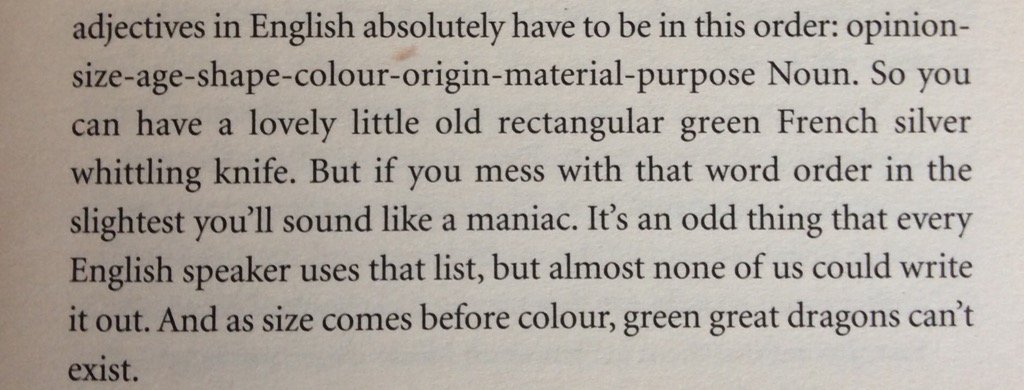samanthafrank: artekka: whetstonefires: the-real-seebs: arjan-de-lumens: titaniumelemental: bookavid
samanthafrank:artekka:whetstonefires:the-real-seebs:arjan-de-lumens:titaniumelemental:bookavid:arkthepieking:exomoon:isashi-nigami:ice-light-red:windycityteacher:burntcopper:things english speakers know, but don’t know we know.WOAH WHAT?That is profound. I noticed this by accident when asked about adjectives by a Japanese student. She translated something from Japanese like “Brown big cat” and I corrected her. When she asked me why, I bluescreened.What the fuck, English isn’t even my first language and yet I picked up on that. How the fuck. What the fuck.Reasoning: It Just Sounds RightOooh, don’t like that. Nope, I do not even like that a little bit. That’s parting the veil and looking at some forbidden fucking knowledge there.How did I even learn this language wtf I had to read “brown big cat” like three times before my brain stopped interpreting it as “big brown cat”I’m kinda reading “brown big cat” as “brown (big cat)”, that is, a “big cat” - like a tiger or lion or other felid of similar size - that happens to be brown. “Big brown cat”, on the other hand, sounds more like a brown cat that’s just a bit bigger than a regular housecat - like a bobcat or a maine coon cat or something like that.yeah, a brown big cat is almost certainly a puma. a big brown cat is probably a maine coon.yeah, if you put the adjectives out of order you wind up implying a compound noun, which is presumably why we have this rule; we stripped out so much inflection over the centuries word order now dictates a huge amount of our grammarJust looked up why we do this and one of the first lines in this article is, “Adjectives are where the elves of language both cheat and illumine reality.” so I know it’s a good article.Things this article has taught me:This same order of adjectives more or less applies to languages around the world. “It’s possible that these elements of universal grammar clarify our thought in some way,” says Barbara Partee, a professor emeritus of linguistics and philosophy at the University of Massachusetts-Amherst. Yet when the human race tacitly decided that shape words go before color words go before origin words, it left no record of its rationale.One theory is that the more specific term always falls closer to the noun. But that doesn’t explain everything in adjective order.Another theory is that as you get closer to the noun, you encounter adjectives that denote more innate properties. In general, nouns pick out the type of thing we’re talking about, and adjectives describe it,” Partee told me. She observes that the modifiers most likely to sit right next to nouns are the ones most inclined to serve as nouns in different contexts: Rubber duck. Stone wall.Rules are made to be broken. Switching up the order of adjectives allows you to redistribute emphasis. (If you wish to buy the black small purse, not the gray one, for instance, you can communicate your priorities by placing color before size). Scrambling the order of adjectives also helps authors achieve a sense of spontaneity, of improvising as they go. Wolfe discovers such a rhythm, a feeling-his-way quality, when he discusses his childhood recollection of “brown tired autumn earth” and a “flat moist plug of apple tobacco.”Brain scans have discovered that your brain has to work harder to read adjectives in the “wrong” order.TL;DR: No one knows why we do this adjective thing but it’s pretty hardwired in.This is fascinating. -- source link
Tumblr Blog : burntcopper.tumblr.com
#linguistics#english
